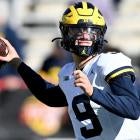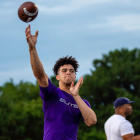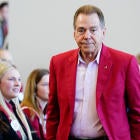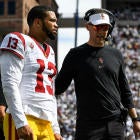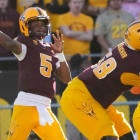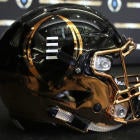The Peach Bowl was in serious trouble 30 years ago. Army and Illinois played the 1985 game before a sparse crowd during a driving rainstorm at Fulton County Stadium. The game barely met NCAA sanctioning requirements that 40 percent of the tickets be purchased locally.
To make matters worse, CBS dropped the Peach Bowl in 1986. Those were the days of the wild west when bowls had to find their own teams. CBS had paid the Peach a rights fee of $375,000, which helped the bowl pay each team $475,000. That money was now gone as other bowls scrambled for teams and TV deals, too.
ABC dropped the Gator Bowl. NBC didn't pick up its option for the Citrus Bowl. There were too many bowl games and too many regular-season games on TV. The 1984 Supreme Court decision that struck down the NCAA's control over TV appearances a team could make created a glut of regular-season games on TV. There weren't enough ad dollars for networks to justify spending that kind of money for Army-Illinois.
"But it's a Catch-22 situation," then-Peach Bowl executive director Dick Bestwick told the Associated Press in 1986. "Without more community support and the television money, no bowl can attract the top teams because of what we can pay them. This is not Dick Bestwick's bowl, it is the city's bowl."
In hindsight, the Peach's crisis turned into its promise to this day, where it's finally hosting a bowl game with national championship implications when Alabama and Washington meet in a College Football Playoff Semifinal. In many ways, the growth of the Peach Bowl reflects the growth of college football.
With the Peach struggling in 1986, Delta CEO Ron Allen wrote a $100,000 check as the first sponsor for the game. Longtime Peach Bowl board member Bob Coggin sold 3,300 tickets. The Metro Atlanta Chamber of Commerce took over managing the bowl, eventually leading to Peach Bowl sponsors like Coca-Cola, Georgia Power, Chick-fil-A, Home Depot and Delta. By 1991, the Peach was on ESPN.
Born in 1968 by the Lions Club of Atlanta, the Peach is now a giant in the bowl industry as the fifth-oldest game. It's no longer the bowl with miserable weather that spurred Arizona State fans to help create the Fiesta Bowl. The Peach finds itself in the same company as the Rose, Cotton, Orange, Sugar and Fiesta in the College Football Playoff rotation. Next year, Atlanta's new $1.6 billion Mercedes-Benz Stadium hosts the national championship game.
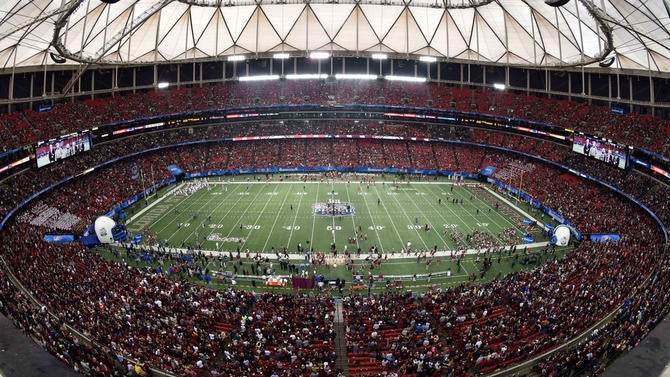
Peach Bowl Inc., which runs the bowl, the Chick-fil-A Kickoff and the Peach's annual golf tournament, reported $30.7 million in net assets during 2014-15. The Pasadena Tournament of Roses Association, which operates the Rose Bowl, listed $34.9 million in net assets.
"We've sort of made it from worst to best, and it's a culmination of a lot of years and a lot of hard work just getting to the top," said Peach Bowl board member Albert Tarica, who has been associated with the bowl since 1969. "If Washington didn't make it to our bowl, their consolation would be they're going to the Rose Bowl. It's kind of nice when the consolation to the Peach is the Rose Bowl."
To understand how the Peach reached this point, it's important to remember how much this game used to struggle. Tarica said the Atlanta business community felt the bowl should be supported by the Lions Club's branch in Atlanta, and even the Lions Club of Georgia didn't see a reason to help.
The first three Peach Bowls were at Grant Field on Georgia Tech's campus.
"Our first game we had every kind of weather you could imagine -- rain, snow, fog," Tarica said. "Then we moved to Fulton County Stadium, which was better. But it was not a football stadium. You had seats on the 50-yard line and you were the furthest away from the field than any other seat because the stadium was round. Plus, you still had the weather."
Ah, the weather. Weather became a recurring theme of the miserable early Peach Bowl years.
"There were times I thought our title sponsor was 'weather-plagued' because every article began with 'weather-plagued Peach Bowl,'" said Gary Stokan, the bowl's current president and CEO.
Consider the legacy of the third Peach Bowl between Arizona State and North Carolina in 1970. Because very few people paid attention to West Coast football, the WAC champion Sun Devils were in danger of missing a bowl for the 19th consecutive year. Even after starting 9-0 in 1970, ninth-ranked Arizona State was in danger of missing a bowl again.
Peach Bowl officials pursued No. 17 Penn State (7-3), but Joe Paterno passed. Atlanta Journal-Constitution sports editor Furman Bisher took up the cause for the Peach to take Arizona State and "stamp out snobbery," as one of his headlines stated.
"Naturally, to us, Arizona seems to be located somewhere between 'Gunsmoke' and 'Ringo,'" Fisher wrote sarcastically after the Peach picked Arizona State. "Crawls with bearded critters who terrorize frontier towns. Hasn't yet put down the Indian uprising. Arizona has trails blazed, and most of them paved. Water is piped in. Planes have begun landing there without fear of ambush."
Arizona State routed North Carolina 48-26 at the 1970 Peach Bowl. Interestingly, those Tar Heels included future ACC commissioner John Swofford and future Sugar Bowl executive director Paul Hoolahan, both of whom would later help shape the bowl industry through deal making. But yeah, the weather was bad that day for the Peach, as usual.
"The Arizona State fans were sitting through this inclement weather and it was 80 degrees in Phoenix that day," Stokan said. "So they said, 'Why don't we do one of these?' So they started talking to [Peach Bowl founder] George Crumbley about how to start a bowl game, and it became the Fiesta. We're inextricably linked with the Fiesta and now this year we both are hosting a semifinal game."
After the Fiesta debuted in 1971, Arizona State played in the first three games. Even though the Peach was a little older, the Fiesta eventually moved ahead in the pecking order and got into the lucrative Bowl Championship Series rotation in 1998 with the Rose, Orange and Sugar.
The Peach, by then playing inside the Georgia Dome, was one of a dozen or so bowls to bid for three BCS spots. The Rose was grandfathered in given its contract with the Big Ten and Pac-10 and the contentious negotiations of just getting the Rose on board with the BCS.
"I remember one of the questions [to the BCS commissioners] was, 'Are you just doing this to get the other three bowls (Orange, Sugar and Fiesta) in by negotiating a bigger price with them?'" Tarica recalled. "They said, 'No, that's not the case. We're going with the best bids.' From what we understood, the Orange and Sugar's bids were not as high as our bids. We were told by people who know if they had gone with the highest-priced bid, it would have been the Fiesta, Gator and Peach. I guess it would have been difficult to drop the Sugar and Orange."
Nonetheless, the BCS negotiations gave the Peach confidence they could compete with the higher-profile bowls. The Peach got shut out again by the BCS in 2006 when it added another bowl, which became a double host by the original four BCS bowls.
"I remember [AJC columnist] Mark Bradley once calling us a third-tier bowl game," Stokan said. "It's kind of interesting to almost go out of business in 1985 and to be called by your own newspaper a third-tier bowl game, and now to see us hosting the national semifinal game."
Stokan told his board if the Peach couldn't get into the BCS on the back side, it would start the BCS on the front end. The Chick-fil-A Kickoff began in 2008, initially pairing Alabama and Clemson. The annual game -- or sometimes two games -- became an attractive made-for-TV and made-for-tourism matchup fans would want in Week 1 with potential national championship implications.
In 2009, Atlanta secured a 30-year deal with the National Football Foundation to acquire the College Football Hall of Fame from South Bend, Indiana. Along the way, the name "Peach" got removed from the bowl to secure a higher title sponsor fee with Chick-fil-A. That allowed the game to move up in the ACC's selection order.
Given the depth of the SEC as the ACC's opponent, the bowl regularly paired top-20 teams and sold out for 17 straight years with an ACC-SEC matchup. Finally, in 2014, the Peach Bowl was picked for the playoff.
Today, Peach Bowl Inc. is big business. Stokan made $680,010 in total compensation in 2014-15, according to the organization's most recent available tax record. That makes him one of the highest-paid bowl directors in the country. Tarica said the Peach board determine Stokan's pay by looking at the average salary of bowl directors.
"We don't want to be at the top, although we think we have the best director, but we want to be toward the top," Tarica said.
According to Stokan, the Peach Bowl has donated almost $22 million since 2002, including $1.7 million in 2016. The Peach pays for an academic coach in all 11 inner-city Atlanta high schools to work with all athletes on their grades and college test scores.
The Peach has provided about $5 million in endowed scholarships to 25 universities, Stokan said. Any student at an inner-city Atlanta high school can apply for the scholarship money. For instance, a student at Clemson is currently receiving $18,000. Stokan said the goal is for the endowed scholarship to mature into a full ride within another five to 10 years.
The Peach also provides $50,000 a year to the Lions Club for vision screenings in the communities of the Peach Bowl and Chick-fil-A Kickoff teams. Players from the participating teams assist in the screenings. Stokan said one child in Athens, Georgia, learned this year through the screenings he was basically blind in one eye.
"The Georgia player who helped basically broke down in tears," Stokan said. "Without us doing the vision screening, that kid would never have known about his eye sight."
Still, what started almost 50 years ago as a charitable endeavor for the Peach has also blown up into a major business as a tax-exempt charitable organization. Bowls are big business, just like everything else in college football.
"It's just amazing compared to where we started, and you kind of wonder, where's the end to this thing?" Tarica said. "How much can college football grow? How much more money can they get out of it? College football has its share of challenges right now. A lot of things are making it difficult for football in general."
Stokan follows a business model that if you stagnate, you die. He constantly wants the Peach to improve so Atlanta can live up to its name as the capital of college football.
Still, for once, the Peach isn't on the outside looking in as the bowl community questions whether some non-playoff bowls will survive longterm. That concern became elevated this month when Leonard Fournette opted not to play in the Citrus Bowl and Christian McCaffrey passed on the Sun Bowl so they wouldn't hurt their NFL Draft prospects. Stokan said it's not his place to say if they made a good or bad decision and it's their right to sit out.
"I'm quoted in USA Today in 1998 saying we have to be careful with the new BCS and that the media attention and all the fan attention doesn't detract from the bowl system," Stokan said. "I remember getting a call from [then-SEC commissioner] Roy Kramer reprimanding me because the BCS was his idea. Having said that, there's so many good things in the bowl system for the players as a reward and the memories that are created."
For once, all eyes are squarely on the Peach with national championship stakes.
"Let's face it, if you're not the top two bowls, what's the significance of the bowl?" Tarica said. "It's sort of an extra trip for the fans and the team. But I think the real games are the playoff and the championship. I think the players are going to be taking a different look at the bowl games and say, 'If this doesn't really mean that much, do I want to risk getting hurt?' Although they may be fine matchups and great games, in the long run, what's their relevance?"
Bestwick, who didn't last long as the Peach Bowl's director in the mid-1980s during the game's crisis, seemed to presciently and humorously understand where the bowl industry was headed 30 years ago.
When the Peach lost CBS, Bestick told the New York Times he wasn't sure what would happen next. Then he ended the call asking the reporter for a favor.
"Could you get me the telephone number for ESPN?"













